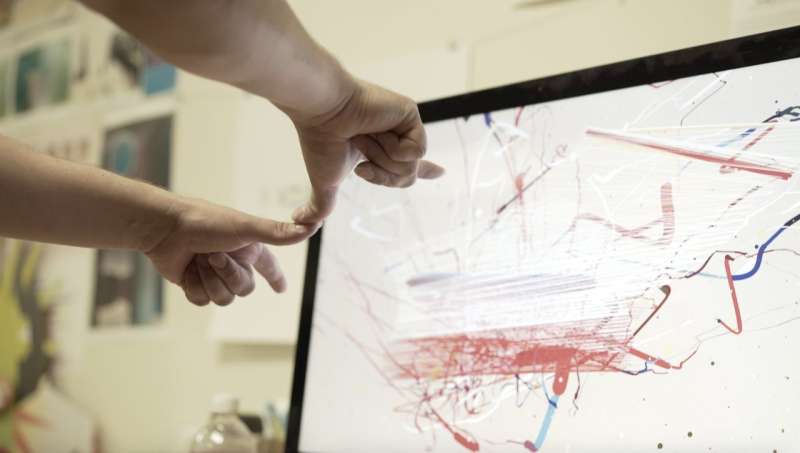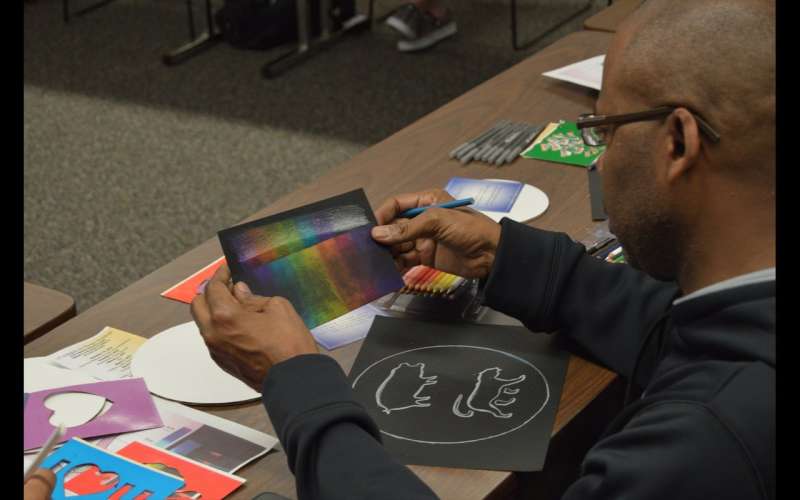Veteran participating in art therapy 1. Credit: UTA
Researchers at The University of Texas at Arlington have found that 98 percent of veterans participating in the University's Artopia program consider that art therapy helped them cope with service-related trauma or disability. An equal percentage reported that art therapy helped them cope with everyday life.
"Texas has one of the highest populations of veterans in the U.S. and very little accredited art therapy support," said Amanda Alexander, UTA associate professor of Art Education and leader of the UTA program. "We decided to develop art therapy workshops and measure symptom relief and healing for men and women dealing with service-related trauma or disabilities."
Alexander received an initial seed grant from the College of Liberal Arts to start the Artopia program and research its effectiveness among veterans at UTA. Five workshops and an art exhibition were developed in 2016 and 2017.
The multidisciplinary project was guided by Alexander from the Art + Art History Department and faculty from the Department of Psychology in collaboration with the Veterans Assistance Center at UTA. Licensed art therapists from The Art Station, a Fort Worth nonprofit art therapy organization, provided the professional art therapy support.
Jane Avila, founder of The Art Station, explained that her organization aims to "find a holistic way of helping veterans to bridge the gap from deployment to civilian life. Art therapy has been shown to reduce cortisol or stress hormone in the body within half an hour, and professionals like ourselves who also have mental health qualifications alongside knowledge of art can enhance that experience."
Veteran participating in art therapy 2. Credit: UTA
Before and after each workshop, researchers conducted a Profile of Mood States (POMS) survey with the veterans to measure psychological distress. The POMS survey is considered an excellent measure and is known for its ease of administration. More than 50 veterans attended the workshops and 33 completed the pre/post POMS survey.
The results were overwhelmingly positive:
- 98 percent said Artopia helped them cope with their service-related trauma
- 98 percent reported that Artopia helped them cope with everyday life
- 97 percent believe that Artopia helped them cope with their loved one's service-related trauma or disability
"With these initial positive results, we are now looking to gain more funding for a larger project with more veterans," Alexander said.
Other positive impacts include:
- The veterans reported that their overall mood disturbance was at least 50 percent lower after participating in Artopia workshops
- 98 percent of the veterans enjoyed working with the art therapists
- 98 percent of the veterans found the Artopia workshops helpful
- 97 percent of the veterans believed that the Artopia workshops were educational
Elizabeth Cawthon, UTA's Dean of Liberal Arts, underlined the importance of this project to UTA, one of the country's leading institutions for veterans.
"Military Times has ranked UTA the no.1 university in Texas for veterans and their families to earn a college degree, and this research really forms part of the services that we can provide to that constituency," Cawthon said. "The project is also a great example of multidisciplinary work of the College of Liberal Arts with the College of Science and the Veterans Assistance Center around the University's Strategic Theme of Health and the Human Condition and effectively allows for new ideas through cross-collaborative work."
Provided by University of Texas at Arlington
























